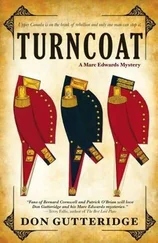Don Gutteridge - Dubious Allegiance
Здесь есть возможность читать онлайн «Don Gutteridge - Dubious Allegiance» весь текст электронной книги совершенно бесплатно (целиком полную версию без сокращений). В некоторых случаях можно слушать аудио, скачать через торрент в формате fb2 и присутствует краткое содержание. Год выпуска: 0101, Издательство: Touchstone, Жанр: Исторический детектив, на английском языке. Описание произведения, (предисловие) а так же отзывы посетителей доступны на портале библиотеки ЛибКат.
- Название:Dubious Allegiance
- Автор:
- Издательство:Touchstone
- Жанр:
- Год:0101
- ISBN:нет данных
- Рейтинг книги:5 / 5. Голосов: 1
-
Избранное:Добавить в избранное
- Отзывы:
-
Ваша оценка:
- 100
- 1
- 2
- 3
- 4
- 5
Dubious Allegiance: краткое содержание, описание и аннотация
Предлагаем к чтению аннотацию, описание, краткое содержание или предисловие (зависит от того, что написал сам автор книги «Dubious Allegiance»). Если вы не нашли необходимую информацию о книге — напишите в комментариях, мы постараемся отыскать её.
Dubious Allegiance — читать онлайн бесплатно полную книгу (весь текст) целиком
Ниже представлен текст книги, разбитый по страницам. Система сохранения места последней прочитанной страницы, позволяет с удобством читать онлайн бесплатно книгу «Dubious Allegiance», без необходимости каждый раз заново искать на чём Вы остановились. Поставьте закладку, и сможете в любой момент перейти на страницу, на которой закончили чтение.
Интервал:
Закладка:
Don Gutteridge
Dubious Allegiance
PROLOGUE
It is the fall of 1837 and the colonial provinces of Upper Canada (later Ontario) and Lower Canada (Quebec) are on the eve of open revolt. The Reform Party of Upper Canada has tried for years to secure legislation that will alleviate the many grievances suffered under the stern and self-serving Family Compact. This small group of Tories holds control of the Executive Council and the Legislative Council and uses its power to block any such legislation forwarded by the democratically elected Legislative Assembly. Moreover, the new lieutenant-governor, Sir Francis Bond Head, secured a majority of Tories in the Assembly in the election of June 1836. The Reformers are left without hope for relief or justice from the governing institutions. A radical wing of the Reformers under the leadership of fiery William Lyon Mackenzie has begun to agitate in the hinterland, threatening insurrection.
In Lower Canada, the restless French population is suffering harsh oppression at the hands of the English minority and the land-owning French seigneurs. An economic depression brings many habitants in rural Quebec to the brink of starvation, while those in the cities see their numerical majority threatened by massive immigration from Britain. All that is needed is leadership, and the Reform-minded patriotes find two in former members of the Legislative Assembly of Lower Canada, Montreal lawyer Louis-Joseph Papineau and Wolfred Nelson, an English-speaking doctor and politician.
Sensing trouble in Lower Canada, Bond Head decides to send all of his regular troops, garrisoned at Toronto, to Montreal to reinforce the regiment there, leaving Upper Canada relatively defenceless. Mackenzie immediately lays plans for a rebel march on the provincial capital.
In Lower Canada, hostilities have already begun. The French rebels under Nelson occupy the town of St. Denis, south of Sorel. The British response is quick and decisive. A large force of regulars, including the Toronto regiment, advances from Montreal to join battle. Life in the Canadian provinces will never be the same.
ONE
QUEBEC: NOVEMBER 1837
It may not be Waterloo, Marc, but by Christ, it’s going to be a bona fide battle!”
Ensign Rick Hilliard had to shout his enthusiasms in order to be heard above the roar of the night-wind, even though he was riding stride for stride beside his superior officer. Lieutenant Marc Edwards made no reply, but Rick’s excitement could not be dampened.
“Don’t you think it was a bold move of the colonel to march the men down to St. Denis in the dark? The element of surprise, eh?”
Marc gave him a non-committal grunt but kept his mind on the business of manoeuvring his mount, a hackney-horse commandeered at Sorel, through the muddy shoals of what passed for a road along the east bank of the Richelieu River. The cold rain had begun not a minute after the battle-group had cleared the outskirts of Sorel and aimed itself southwest towards its target, a fortified position of the rebels just above St. Denis. It comprised four companies of the 24th Regiment, one company of the 32nd, a motley collection of militia cavalry from Montreal, along with a twenty-four-pounder and its artillery crew.
Half an hour later, snow was added to the rain. It was late November in Quebec, and the weather showed no mercy. The wind-gusts were icy and keen as flails against the exposed flesh of face or finger. The chilling damp soon penetrated every crevice of clothing, every nook of body warmth. Uniforms stiffened. Boots grew slick. Footing became treacherous.
“There’s something up there in the woods,” Marc said.
“I can’t even see the woods,” Rick said, leaning across his saddle so that he was no more than a foot from Marc’s shoulder.
“That shadow up there on your right, at two o’clock.”
Shielding his eyes with his right hand, Rick could discern, between gusts of wet snow, the ragged profile of a line of evergreens that must border the nearby river itself. “Yes, I see it now.”
“Something moved up there, animal or human. Do you want to have a look?”
Rick grinned and dug his heels into his mount.
“Take some men with you!” Marc called out after him. “If you can find any!”
Marc’s squad was at the head of the column to reconnoitre and skirmish with any scouts or advance units of the rebel contingent, should that be necessary. At least that was Colonel Gore’s plan. But the quagmire of the road and the late-November storm, not to mention the pitch dark, reduced the infantryman to a staggering, lurching parody of the proud and fearless redcoat. Should the moon have been perverse enough to burst out and illuminate the scene below it, not a wink of military scarlet would have been visible. At the end of a single hour’s march, three hundred of Queen Victoria’s finest were caked with mud, boot to cap. Many sank up to their knees in the frigid gumbo, and in a desperate effort to free a boot from permanent lodgment tipped backwards into the mire and had to be helped erect by the nearest upright comrade. And since nothing could be seen in the darkness, the only means of communication was the disembodied shout. The curses and cries of the foot-soldiers could be heard but faintly. Only the roadway guided them, defined by its ribbon of mud between grassy verges, irregular hedgerows, or the ragged vestiges of the autumn’s failed crops.
The mounted militia unit from Montreal fared no better than the men on foot. Assigned to protect the flanks of the straggling column, the cavalry floundered about, with more gusto than guile, on the periphery of the slogging riflemen, bumping into each other in the impenetrable murk and periodically stepping on a soldier unable to leap aside. Three of their horses broke a limb in such collisions and had to be shot, the report of the Brown Bess shuddering through the column and momentarily silencing all complaint-a sharp reminder that the mission they had embarked upon was much more than the minor inconvenience of a forced march over inhospitable ground.
But if man and horse had difficulty with the mud, the rain, and the absence of light, then the wagons carrying the supplies, the twenty-four-pounder and its sixty-eight round shot were bound to suffer an even worse journey. A mile above St. Ours, a village halfway between Sorel and their destination, the road had simply vanished into a swampy morass, and the wagons sank to their axles. The men in charge lashed the stalled horses-more in spite than hope-and then had to be themselves rescued by their mates: bootless, chilled to the bone, and too weary to curse God or their officers. Marc had ridden back to one such mêlée, barked orders at a squad of the Montreal cavalry who were milling about ineffectually on the grassy verge of the woods nearby, and soon the wagons and gun carriage had been hauled laterally onto firmer ground, where they proceeded cautiously forward until some semblance of the road reappeared.
“You were right, sir,” Hilliard shouted as he rode up beside Marc. “I spotted three fellows, civilians, in that clump of bush over there, but they scampered off into the dark towards the river. I ordered the men to hold their fire and went after them. But they had a little dory of some kind waiting and were out into the river before I could draw my pistol.”
“So much for the strategy of surprise,” Marc said.
“Well, it was a decent idea in theory,” Hilliard said, defending Colonel Gore’s unpopular decision to attack St. Denis and the rebels by stealth in the pre-dawn mists. Nor was the mood of men and officers much cheered by the fact that Colonel Gore was deputy quartermaster-general of British forces in the Canadas, a man whose only battle experience to this point had been skirmishing for the high ground of magazine and commissary.
Читать дальшеИнтервал:
Закладка:
Похожие книги на «Dubious Allegiance»
Представляем Вашему вниманию похожие книги на «Dubious Allegiance» списком для выбора. Мы отобрали схожую по названию и смыслу литературу в надежде предоставить читателям больше вариантов отыскать новые, интересные, ещё непрочитанные произведения.
Обсуждение, отзывы о книге «Dubious Allegiance» и просто собственные мнения читателей. Оставьте ваши комментарии, напишите, что Вы думаете о произведении, его смысле или главных героях. Укажите что конкретно понравилось, а что нет, и почему Вы так считаете.












